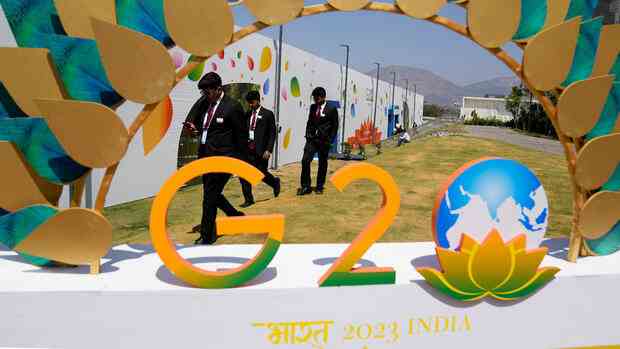The finance ministers of the G20 will jointly discuss the debt crises in several countries.
(Photo: AP)
Berlin, Bombay The finance ministers and central bank governors of the large industrialized and emerging countries (G20) will be discussing the debt crisis in many poor countries in Bangalore in southern India from Friday – and they will be almost directly on the spot: many countries around India have recently gotten into financial difficulties.
Sri Lanka slipped into bankruptcy last year. Bangladesh is dependent on billions in aid from the International Monetary Fund (IMF). Pakistan’s economy is on the verge of collapse in the face of a huge mountain of debt.
Host India sees finding a solution to these debt problems as one of the main tasks of its G20 presidency. Support comes from institutions such as the IMF and Western industrialized countries. They want to prevent a global debt crisis that would also weigh on the global economy.
The G20 countries must ensure that the situation remains stable, said Federal Finance Minister Christian Lindner (FDP) before he left for Bangalore.
IMF chief Kristalina Georgieva warned on Wednesday that rising borrowing costs were exacerbating the situation in countries with high external debt. They are struggling with interest rate hikes and the strong US dollar. About 15 percent of poorer countries are in financial distress, Georgieva explained. For another 45 percent there is a high risk. And even from the economically stronger emerging countries, 25 percent would be confronted with borrowing costs that they could hardly bear.
>> Read here: Pakistan is hoping for the IMF as a last resort
The IMF, the World Bank and India have therefore invited to a “global round table on public debt” on Saturday. In addition to finance ministers from the industrialized countries, private creditors such as the US investor Blackrock and the British bank Standard Chartered are also to take part in the meeting. Negotiations are also taking place within the group of G20 finance ministers.
China as the developing countries’ largest creditor
One country in particular will be the focus of the talks: China. India’s government wants to increase pressure on China to agree to debt relief. The world’s largest bilateral creditor to emerging and developing countries has recently been criticized several times for blocking debt restructuring negotiations.
Even before the start of the meeting in Bangalore, the Indian G20 chief negotiator, Amitabh Kant, called on the government in Beijing to give in: “It is unacceptable for the International Monetary Fund to cut its debt and thus settle the Chinese claims,” he said. Everyone has to make their contribution. Lindner also emphasized that China “plays an important role”.
>> Read here: This is the traffic light’s secret project list against China’s influence
According to calculations by the World Bank, the poorest countries in the world have to transfer around 62 billion dollars a year to bilateral creditors to service their debts – the countries owe two thirds of their debts to China.
In countries like Pakistan, a solution to the debt crisis without China’s participation is hardly conceivable. While Western creditor states have lent Pakistan around $10 billion, the country owes China and its state banks around $30 billion, according to an IMF report from September. 30 percent of Pakistan’s foreign debt is in the hands of China, which financed expensive infrastructure projects in the country as part of its Silk Road Initiative.
Who has to waive claims?
Two years ago, when the debt of many countries shot up during the corona pandemic, the G20 finance ministers agreed on a framework agreement on how poor countries can be supported. But when it comes to specific debt relief for individual states and the question of which creditor will waive how much, there are still major differences of opinion.
“Which instrument is chosen in detail is then a question that has to be discussed and decided together. But no one is allowed to dodge, no one is allowed to ignore their responsibility,” emphasized Lindner. IMF boss Georgiewa demanded: “The rules of the game must be clarified and the processes must be made more efficient and effective.”
>> Read also: India pushes onto the world stage – G20 presidency puts Modi in the role of mediator
The government in Beijing is demanding that organizations such as the World Bank also refrain from making demands. The USA and other countries strictly reject this. The IMF and the World Bank usually have a special status and do not have to forgo the repayment of their aid loans. Otherwise, so the argument goes, subsequent rescue packages are no longer possible.
It is questionable whether, in view of the opposing positions, a breakthrough will be achieved at the meeting in Bangalore. But it is at least about continuously applying pressure, according to Berlin.
More: India wants to take advantage of China’s weakness – but still has a lot of catching up to do
